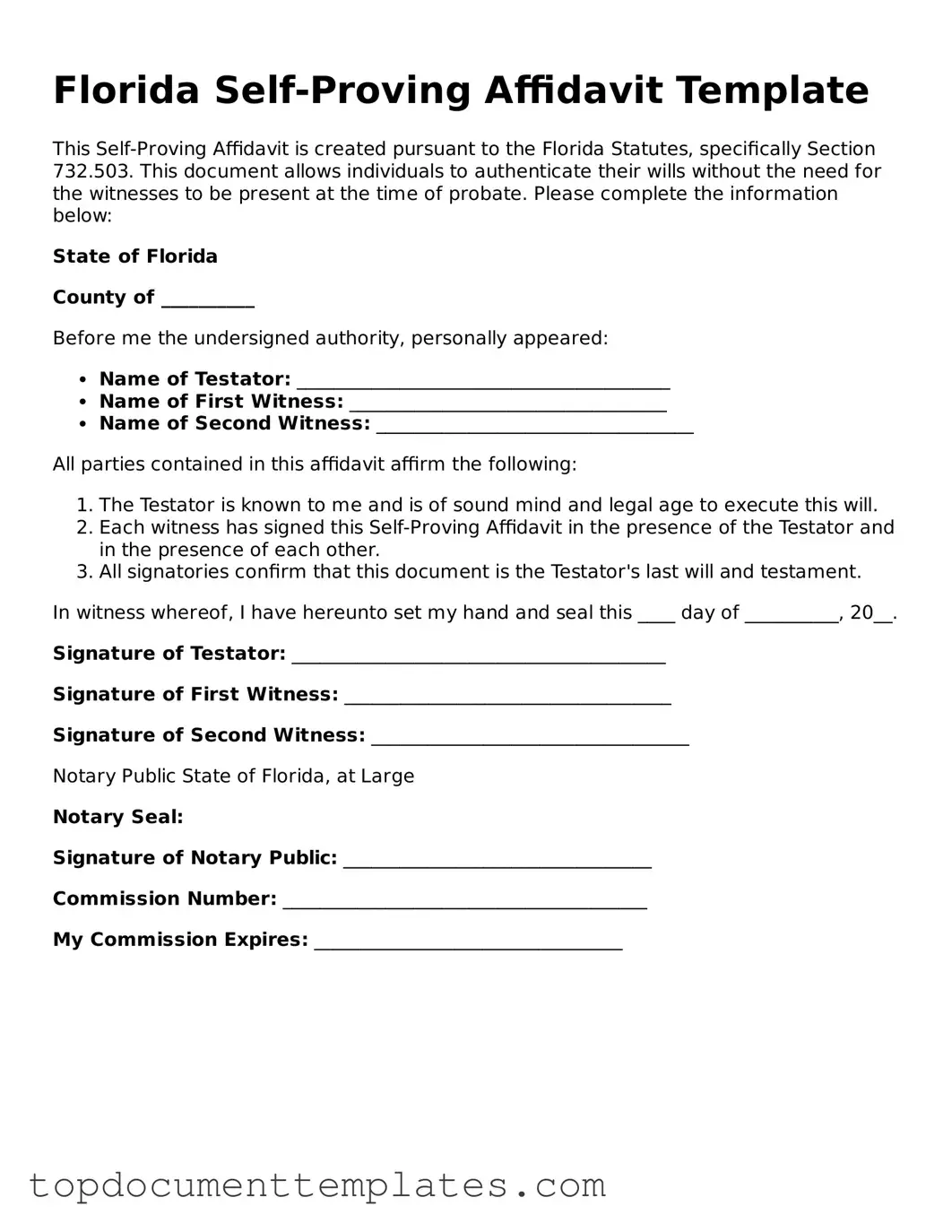Valid Self-Proving Affidavit Form for Florida State
The Florida Self-Proving Affidavit is an important legal document that simplifies the process of validating a will after a person passes away. By using this form, testators can streamline the probate process, making it easier for their heirs to execute their wishes without unnecessary delays. This affidavit is typically signed by the testator and witnesses in the presence of a notary public. It serves as proof that the will was executed properly, which can help avoid disputes among family members. In Florida, this form is particularly useful because it allows the will to be accepted by the court without the need for the witnesses to appear in person during probate. This can save time and reduce complications, ensuring that the deceased's intentions are honored efficiently. Understanding how to properly complete and file this affidavit can be crucial for anyone involved in estate planning in Florida.
Similar forms
The Self-Proving Affidavit form shares similarities with several other legal documents. Each of these documents serves a unique purpose but often involves declarations or affirmations that enhance their validity. Here are four documents that are similar to the Self-Proving Affidavit:
- Power of Attorney: This document allows one person to act on behalf of another. Like the Self-Proving Affidavit, it often requires signatures and witnesses to ensure its authenticity and prevent fraud.
- Motor Vehicle Bill of Sale: This legal document records the sale of a vehicle, providing proof of ownership transfer. For more information on this form, visit documentonline.org/blank-illinois-motor-vehicle-bill-of-sale.
- Will: A will outlines how a person's assets should be distributed after their death. Both documents require a formal declaration and may include witness signatures to validate the intentions of the individual.
- Living Will: A living will specifies a person's wishes regarding medical treatment in case they become incapacitated. Similar to a Self-Proving Affidavit, it often requires a notarized signature to confirm that the individual's wishes are legally binding.
- Affidavit of Identity: This document is used to verify a person's identity in legal matters. Like the Self-Proving Affidavit, it is a sworn statement that provides assurance regarding the identity and intentions of the individual involved.
Guidelines on Writing Florida Self-Proving Affidavit
Once you have gathered the necessary information and documents, you can begin filling out the Florida Self-Proving Affidavit form. This form is essential for ensuring that a will can be validated without the need for witnesses to testify in court. Follow the steps below to complete the form accurately.
- Start by entering the date at the top of the form where indicated.
- Provide the name of the testator (the person who created the will) in the designated space.
- Next, include the names and addresses of the witnesses. You will need at least two witnesses for the affidavit.
- In the appropriate section, have the testator sign their name. This should be done in the presence of the witnesses.
- After the testator has signed, each witness should sign the form as well. They must also print their names and provide their addresses.
- Finally, the notary public will complete their section, including their signature and seal, to officially notarize the document.
After completing the form, ensure that all signatures are legible and that the document is properly notarized. This will help facilitate the process of validating the will in the future.
File Information
| Fact Name | Details |
|---|---|
| Definition | A Florida Self-Proving Affidavit is a legal document that allows a will to be validated without the need for witnesses to testify in court. |
| Governing Law | This affidavit is governed by Florida Statutes, Chapter 732.503. |
| Purpose | The primary purpose is to simplify the probate process by affirming the validity of the will. |
| Signature Requirement | The testator must sign the will in the presence of two witnesses, who must also sign the affidavit. |
| Notarization | The affidavit must be notarized to be considered self-proving. |
| Use in Probate | When presented in probate court, the self-proving affidavit eliminates the need for witness testimony. |
| Form Availability | Forms can typically be obtained from legal stationery stores, online legal services, or law offices. |
| Revocation | A self-proving affidavit can be revoked if the testator creates a new will or modifies the existing one. |
| State-Specific | While this affidavit is specific to Florida, other states have similar provisions with varying requirements. |
| Legal Advice | It is advisable to seek legal counsel when preparing a will and self-proving affidavit to ensure compliance with state laws. |
Other Popular Self-Proving Affidavit State Forms
What Is a Self-proving Will - The affidavit helps document the testator’s intent regarding their estate.
When establishing a Power of Attorney in Texas, it's crucial to recognize the specific functionalities it serves in safeguarding your interests and ensuring that decisions align with your intentions. For further insights and resources on this important legal document, you can visit TopTemplates.info, which provides comprehensive information on the Power of Attorney form and its applications.
How to Make an Affidavit - It ensures that the testator's intentions are honored without unnecessary delays.
